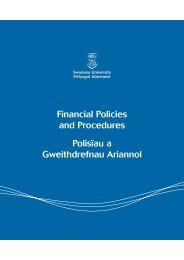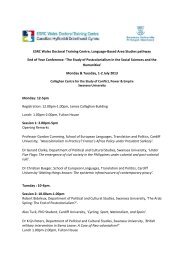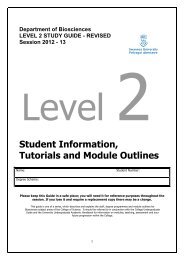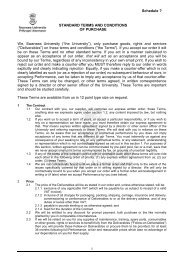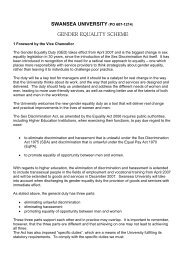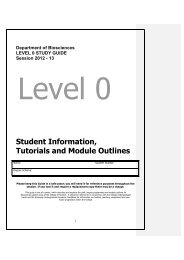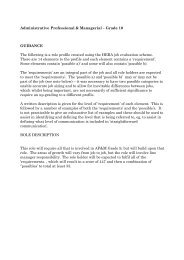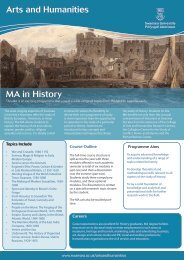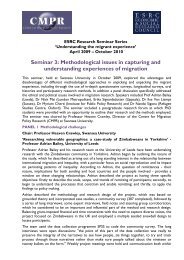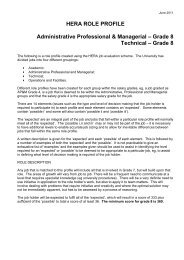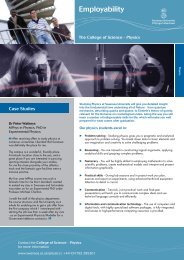job share policy - Swansea University
job share policy - Swansea University
job share policy - Swansea University
You also want an ePaper? Increase the reach of your titles
YUMPU automatically turns print PDFs into web optimized ePapers that Google loves.
JOB SHARE POLICY<br />
Introduction<br />
<strong>Swansea</strong> <strong>University</strong> encourages the principle of <strong>job</strong> sharing, where this is possible, at<br />
all levels in the <strong>University</strong>. It recognises that the option of <strong>job</strong> sharing allows equality<br />
of opportunity to individuals who, for whatever reason cannot work full time. The<br />
<strong>University</strong> also recognises that <strong>job</strong> sharing represents a flexible and innovative<br />
approach to the recruitment and retention of staff and may be the only option if an<br />
employee wants to work part time but the Department/School requires a full time<br />
position.<br />
Job sharing is an arrangement whereby two (or more) employees divide the duties<br />
and responsibilities of one full time post and the salary and benefits are divided<br />
between them according to the amount of time they each work. Both partners take<br />
joint responsibility for the whole <strong>job</strong>.<br />
In practice, this means that when Heads of Departments and Schools agree a full<br />
time posts is suitable for <strong>job</strong> sharing it should be advertised as a full time position,<br />
and the advert and details of the post will include the phrase "<strong>job</strong> <strong>share</strong> applicants<br />
are welcome to apply". Full time posts should not, however, be advertised as suitable<br />
only for <strong>job</strong> sharing as such an arrangement would exclude those who wish to work<br />
full time.<br />
Similarly, Heads of Departments/Schools may agree to full time staff in post<br />
requesting to <strong>share</strong> their post where such a request is made voluntarily.<br />
Many posts in the <strong>University</strong> may well be suitable for <strong>job</strong> <strong>share</strong> arrangements. It is<br />
the intention of the Human Resources Department to advertise all vacancies on a <strong>job</strong><br />
<strong>share</strong> basis unless the Head of Department/School can show why this would not be<br />
practical. Any refusal to consider a <strong>job</strong> <strong>share</strong> arrangement must be justified<br />
objectively by the Head of Department/School.<br />
Job Share Opportunities<br />
a) Vacant Posts<br />
When it has been agreed that a vacancy will be considered on a <strong>job</strong> <strong>share</strong> basis, the<br />
following procedure should apply:<br />
Advertising<br />
The phrase 'suitable for <strong>job</strong> sharing' will appear in the advert and in the Job<br />
Description or Further Particulars of the vacancy. Applicants will be asked on the<br />
application form to indicate whether they would like to apply on a full time or <strong>job</strong><br />
<strong>share</strong> basis. All candidates must be considered against the <strong>job</strong> description and<br />
person specification in the first instance.<br />
Shortlisting<br />
Members of a shortlisting panel should compare all applicants against the criteria for<br />
the post and select the best candidates to attend an interview. The fact that an<br />
applicant would like to work on a <strong>job</strong> <strong>share</strong> basis should not be considered at the<br />
shortlisting stage.
Interviews<br />
The selection of <strong>job</strong> <strong>share</strong> applications will be carried out in accordance with current<br />
recruitment practices. At this stage, each shortlisted candidate will be interviewed<br />
separately.<br />
In determining the suitability of a <strong>job</strong> <strong>share</strong> partnership, the selection panel must be<br />
satisfied that the proposed pattern of working meets the demands of the post.<br />
In the event of only one <strong>job</strong> <strong>share</strong> applicant being considered appropriate for the post<br />
the selection panel must decide whether a full time appointment or a <strong>job</strong> <strong>share</strong><br />
arrangement would be most appropriate. If the best person for the <strong>job</strong> is the single<br />
<strong>job</strong> <strong>share</strong>r then the Department/School may need to advertise again for a <strong>job</strong> <strong>share</strong><br />
vacancy.<br />
Offer of appointment<br />
If two (or more) applicants are appointed to the post they should each have the same<br />
terms and conditions of employment. Benefits such as pay, annual leave and bank<br />
holiday entitlement should be allocated on a pro rata basis depending on the hours<br />
worked.<br />
Joint/Linked Applications<br />
Two applicants may make a joint or linked application for a vacant position. These<br />
applicants should be considered as a partnership. If, at the shortlisting stage, one<br />
half of a joint application is rejected, the successful half should be given the option of<br />
continuing to the interview stage or withdrawing their application. Similarly, if one half<br />
of a joint application proves unsuccessful at the final selection stage, he/she should<br />
be rejected. The remaining partner should be offered the option of being considered<br />
either on a full time basis or to work with another <strong>job</strong> <strong>share</strong> partner.<br />
b) Existing Post holders<br />
An existing full time employee may formally apply to their Head of<br />
Department/School for a <strong>job</strong> <strong>share</strong> arrangement to be agreed in respect of their post.<br />
Where the Head of Department/School agrees to the request, a request should be<br />
submitted to the Senior Management Team to advertise for the other half of the post.<br />
If this request is successful, the post should be advertised as a part time position<br />
specifying the available hours. If the Head of Department/School does not agree to<br />
the post being worked on a <strong>job</strong> <strong>share</strong> basis then they should provide an objective<br />
reason for this decision.<br />
Only when a suitable candidate is appointed will the existing employee be able to<br />
commence <strong>job</strong> sharing.<br />
In certain instances existing employees may make a joint application to <strong>share</strong> either<br />
of the posts held by them. In this case one full time vacancy will become available.<br />
This would need to be considered by the Cost Centre Working Group and if agreed<br />
advertised as a full time/<strong>job</strong> <strong>share</strong> vacancy.<br />
The resignation of one <strong>job</strong> <strong>share</strong> partner<br />
If one partner in a <strong>job</strong> <strong>share</strong> arrangement leaves, the post will be offered as a full<br />
time post to the remaining <strong>job</strong> <strong>share</strong>r in the first instance. If the remaining partner<br />
does not wish to work full time, the single <strong>job</strong> <strong>share</strong> post will be advertised. The<br />
remaining <strong>job</strong> <strong>share</strong>r may be offered extra hours temporarily, but is not compelled to<br />
take them.
If another suitable <strong>job</strong> <strong>share</strong> partner cannot be found and it is necessary to for the<br />
post to be filled for the whole of the full time hours, the remaining <strong>job</strong> <strong>share</strong> partner<br />
will, wherever possible, be redeployed to another post, with the same, or similar,<br />
hours of work.<br />
Only in exceptional circumstances, when all the above options have been exhausted,<br />
will the termination of the existing <strong>job</strong> <strong>share</strong>r's employment be considered. This<br />
possibility should be explained fully to anyone considering or taking up a <strong>job</strong> <strong>share</strong><br />
appointment.<br />
Reasons for refusing a <strong>job</strong> <strong>share</strong> arrangement<br />
The <strong>University</strong> can refuse a request for a <strong>job</strong> <strong>share</strong> arrangement if the Head of<br />
Department/School considers that the proposed changes would lead to one of the<br />
following:<br />
a) Additional costs to the Department/School<br />
b) Detrimental effect on the ability to meet customer demand<br />
c) Inability to reorganise the work among existing staff<br />
d) Inability to recruit additional staff<br />
e) Detrimental impact on quality<br />
f) Detrimental impact on the performance of the Department/School<br />
g) Insufficiency of work at the proposed times of work<br />
h) Planned structural changes within the Department/School<br />
Job split<br />
This is similar to <strong>job</strong> <strong>share</strong> but is more like two part time posts covering a full time<br />
post. A <strong>job</strong> split comes about mainly when a full time employee requests reducing<br />
their hours or to work on a <strong>job</strong> <strong>share</strong> basis. The split occurs if the <strong>job</strong> can be broken<br />
down into two separate roles, either at the same or different grades. For example a<br />
full time Administrative Officer may ask to go part time. The remaining part of his or<br />
her <strong>job</strong> could be advertised as a <strong>job</strong> <strong>share</strong> or the <strong>job</strong> could be broken down into clear<br />
administrative roles as well as less demanding clerical roles. Instead of advertising<br />
for the same grade post on a <strong>job</strong> <strong>share</strong> basis, the <strong>University</strong> could advertise for a<br />
lower grade <strong>job</strong>, possibly for more hours than that which is left by the postholder.<br />
The salary would not necessarily be the same.<br />
Review period<br />
If <strong>job</strong> sharing is arranged it is recommended that a review period be introduced to<br />
enable the Head of Department/School to establish whether this is working<br />
satisfactorily. At least 3 months should be allowed before the review to provide<br />
sufficient time for the <strong>job</strong> <strong>share</strong>rs to demonstrate that the arrangement works and to<br />
smooth out any issues which may have arisen, such as communication.<br />
Terms and Conditions of Appointment for <strong>job</strong> <strong>share</strong> employees<br />
Job <strong>share</strong> employees should not be treated less favourably than full time employees<br />
under the Part time Workers (Prevention of less favourable Treatment) Regulations<br />
2000.<br />
a) Each <strong>job</strong> <strong>share</strong> partner will have a separate Contract of Employment. The post<br />
holders' <strong>job</strong> <strong>share</strong> title will be that given to the full time <strong>job</strong> with the
endorsement - Job Share, for example Part time Lecturer - <strong>job</strong> <strong>share</strong>. Each <strong>job</strong><br />
<strong>share</strong>r will be allocated to the same position on the <strong>University</strong> establishment.<br />
b) Job <strong>share</strong>rs will be paid pro-rata to the full time rate for the number of hours<br />
worked. Commencing salary and increments where applicable will be<br />
determined in accordance with normal practice. Individual <strong>job</strong> <strong>share</strong>rs may be<br />
paid at different rates within the same salary scales to reflect different levels of<br />
experience, skills and abilities.<br />
c) The hours to be worked will be individually stated in each partner's contract.<br />
Total hours will not exceed the hours for the full time post.<br />
d) The work may be divided in a number of ways (e.g. with each partner working<br />
mornings/afternoons only or a combination of working days split between the<br />
two partners, etc.) Job <strong>share</strong>rs and Heads of Departments/Schools should<br />
agree a working pattern at the outset.<br />
e) It may be necessary within a working pattern that <strong>job</strong> <strong>share</strong>rs have a period of<br />
'overlap' on a regular basis. When this is necessary, it should be part of the<br />
established pattern of work and will be contained within the working week.<br />
f) Job <strong>share</strong>rs will receive the standard pro rata annual leave provisions<br />
according to the agreed arrangements for that particular staff group. Where <strong>job</strong><br />
<strong>share</strong>rs work different days of the week, statutory holidays and closure days<br />
will be <strong>share</strong>d equally between them. All arrangements for annual leave and<br />
bank holiday leave should be agreed at the outset.<br />
g) Job <strong>share</strong>rs will automatically be eligible for membership of the appropriate<br />
Superannuation Scheme and will make contributions and receive benefits on a<br />
pro rata basis.<br />
h) Job <strong>share</strong>rs will be entitled to maternity/paternity leave where appropriate in<br />
accordance with the usual <strong>University</strong> provision. Payment during maternity<br />
leave will be pro-rata to the full time contracted hours.<br />
i) All rights which are available to full time staff for training opportunities will apply<br />
to <strong>job</strong> <strong>share</strong>rs.<br />
j) Job <strong>share</strong>rs will be considered for promotion in the same way as full time and<br />
other part-time employees.<br />
Guidelines for <strong>job</strong> sharing employees<br />
<br />
<br />
<br />
<br />
<br />
Each partner is responsible for the whole <strong>job</strong>.<br />
Each partner should communicate effectively with the other particularly if an<br />
overlap in work time is not provided. Clear messages should be left on work<br />
which has not been completed.<br />
Communication within the Department/School is important. Contacts need to be<br />
aware that another individual may pick up a task or deal with their enquiry.<br />
No partner is senior to the other therefore there should be no delegation or<br />
leaving the undesirable <strong>job</strong>s such as filing to the other partner<br />
If a problem occurs both partners should take responsibility. There should be no<br />
blame passed between <strong>job</strong> <strong>share</strong>rs.
If one <strong>job</strong> <strong>share</strong>r is performing less well than the other, this should be addressed<br />
as soon as possible by the Head of Department/School and the weaker<br />
performer be supported by the normal university procedures.<br />
If <strong>job</strong> <strong>share</strong>rs are on fixed term contracts, both must be consulted and an<br />
alternative <strong>job</strong> <strong>share</strong> post be sought. In the situation where only a part time<br />
position is available, there should be a competitive interview to assess who is the<br />
most suitable to meet the requirements of the part time post.




